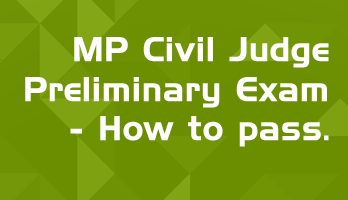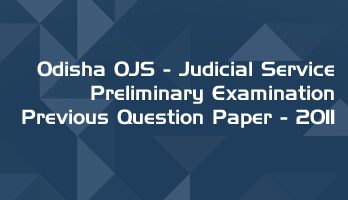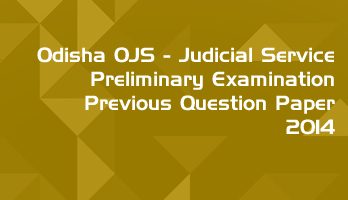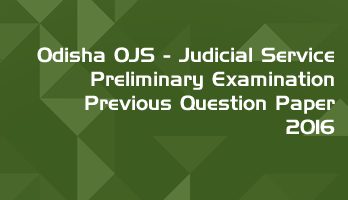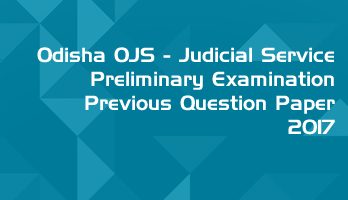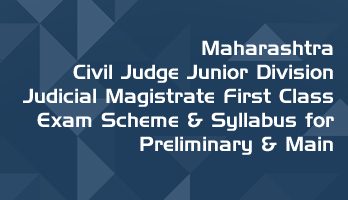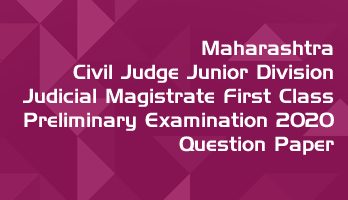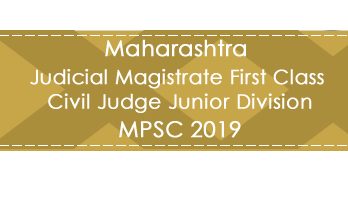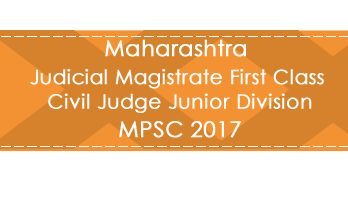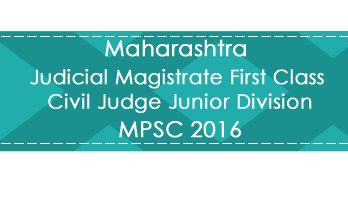Odisha OPSC OJS Judicial Prelims 2025 and 2026 - 155 Mock Tests & Previous Question Papers
- 100 Full Length Mock Tests - with unlimited practice
- 55 Topic wise Mock Tests covering all the topics in the syllabus
- Previous Question Papers - with official answer keys
- Downloadable PDF copies of all bare acts as per syllabus
- Database of over 15000+ MCQs
- Mock Tests designed as per latest syllabus and pattern
- Access valid for one year from date of purchase
- Questions & Answer Choices randomly shuffled in every attempt for better practice
- Accessible 24 x 7 via Smart-Phone browsers, Laptops, Desktops and Tablets
- This question paper, with official answer key is available on our Odisha OJS Preliminary Online Mock Test & Previous Question Papers Series.
- Unlimited access for one year from the date of purchase
- Mock tests are updated as per the latest pattern and syllabus
- See the links at the top to buy the online Odisha OJS Judicial mock tests
1. In which of the following cases, Supreme Court held that Preamble can be amended without altering its basic features?
(A) Golaknath Case
(B) Maneka Gandhi Case
(C) S. R. Bommai v. Union of India
(D) Kesavananda Bharati Case
2. When there is a conflict between an Act made by the Parliament and a State legislature on the same subject, which of the following doctrines shall be applicable?
(A) Doctrine of colourable legislation
(B) Doctrine of pith and substance
(C) Doctrine of repugnancy
(D) None of the choices
3. “Capital Punishment is not violative of Article 21 of the Constitution of India.” It has been held in the case of:
(A) Muthu v. State
(B) Bachan Singh v. State of Punjab
(C) Bhikaji v. State of M. P.
(D) Smt. Gian Kaur v. State of Punjab
4. When there is a conflict between Fundamental Rights as declared by Part -II and the Directive Principles of State Policy (Part – IV), which will prevail:<br>(A) Directive Principles<br>(B) Fundamental Rights
(A) (A) only
(B) (B) only
(C) Both (A) and (B)
(D) Neither (A) nor (B)
5. ______ of the Indian Constitution lays down that Union of India and the States are juristic persons and can sue and be sued.
(A) Article 225
(B) Article 285
(C) Article 300
(D) Article 348
6. In which of the following Cases the Supreme Court held that capitation fee is unconstitutional?
(A) St Stephens College v. State
(B) Indra Sawhney v. Union of India
(C) Mohini Jain v. State
(D) None of the choices
7. In which of the following Cases the Supreme Court held that right to shelter is a part of fundamental right guaranteed under Article 21 of the Constitution of India?
(A) Olga Tellis Case
(B) Sheela Barse Case
(C) Sarala Mudgal Case
(D) None of the choices
8. When a writ is issued to an inferior court or tribunal on ground of exceeding the jurisdiction or acting contrary to the rules of natural justice, it is called a writ of:
(A) Certiorari
(B) Mandamus
(C) Quo Warranto
(D) Habeas corpus
9. We borrowed the Concept of Fundamental Duties from the:
(A) American Constitution
(B) Irish Constitution
(C) Canadian Constitution
(D) USSR Constitution
10. Which of the following Articles of the Constitution of India guarantees Right of minorities to establish and administer educational institutions?
(A) Article 28
(B) Article 29
(C) Article 27
(D) Article 30
11. An ex parte decree can be set aside on the ground that:
(A) Summons were not duly served
(B) Non-appearance of defendant as copies of documents filed with plaint were not provided to defendant
(C) Defendant refused to receive the summons and thereafter no fresh summons were issued to him
(D) An ex parte decree cannot be set aside under any circumstance
12. In which of the following cases, the Code of Civil Procedure, 1908 provides for passing a preliminary decree?
(A) Suits for dissolution of partnership
(B) Suit for accounts between principal and agent
(C) Suits partition and separate possession
(D) All of the choices
13. In deciding the question of jurisdiction one must always have regard to the:
(A) Form of the suit
(B) Substance of the matter
(C) Status of parties
(D) None of the choices
14. In a suit where doctrine of res judicata is applicable, the suit is liable to be:
(A) Dismissed
(B) Rejected
(C) Stayed
(D) None of the choices
15. X residing in Delhi, publishes statements defamatory of Y in Calcutta, Y can sue X at:
(A) Delhi
(B) Calcutta
(C) Either in Delhi or in Calcutta
(D) At any court, at the option of the plaintiff
16. Which of the following Sections of the Code of Civil Procedure, 1908 deals with the place of suing regarding movable property?
(A) Section 17
(B) Section 18
(C) Section 19
(D) Section 20
17. In order to claim set off, which of the following conditions must be satisfied?
(A) Suit must be for recovery of money and the sum must be ascertained
(B) Sum must not exceed the pecuniary jurisdiction of the court
(C) Sum must be legally recoverable by defendant from plaintiff
(D) All of the choices
18. The court passes an ex parte decree against A. A files another suit alleging that the decree is obtained by the plaintiff by fraud. The suit is:
(A) Maintainable
(B) Not maintainable
(C) Depends
(D) None of the choices
19. A second appeal under Section 100 of the Code of Civil Procedure lies
(A) On question offsets
(B) On substantial question in law
(C) On mixed questions of law and fact
(D) All of the choices
20. A suit for the partition of immovable property, shall be instituted in the court within the local limits of whose jurisdiction the:
(A) Property is situated
(B) Plaintiff resided
(C) Defendant resided
(D) Any of these
21. The procedure for serving the summons is provided in of the Code of Criminal Procedure, 1973.
(A) Section 59
(B) Section 60
(C) Section 61
(D) Section 62
22. X a married man had illicit relations with Y and a child was born from that relationship. Later X deserted Y. Y filed an application for maintenance to her and her child from X? Decide:
(A) Y and her child are entitled to maintenance from X
(B) Y and her child are not entitled to maintenance from X
(C) Y is not entitled but her child is entitled to maintenance from X
(D) None of the choices
23. An order under Section 144 of the Code of Criminal Procedure, 1973:
(A) May be passed ex-parte
(B) Cannot be passed ex-parte
(C) Can be passed only after an inquiry
(D) None of the choices
24. The Supreme Court upheld the constitutional validity of Section 151 of the Code of Criminal Procedure, 1973 in:
(A) Joginder Kumar v. State of Uttar Pradesh
(B) M. C. Abraham v. State of Maharashtra
(C) D. K. Basu v. State of West Bengal
(D) Ahmed Noor Mohammed v. State
25. Which of the following powers is not available to a Police Officer who receives an order from the magistrate to investigate a non-cognizable offence?
(A) Power to search
(B) Power to seize
(C) Power to arrest
(D) None of the choices
26. Which of the following Sections of the Code of Criminal Procedure, 1973 deals with the ‘examination of witnesses by police’?
(A) Section 159
(B) Section 160
(C) Section 161
(D) Section 165
27. Which of the following Sections of the Code of Criminal Procedure, 1973 deals with medical examination of the victim of rape?
(A) Section 163A
(B) Section 164A
(C) Section 165A
(D) Section 166A
28. Who among the following may file an application for plea bargaining?
(A) Accused
(B) Complainant
(C) Prosecutor
(D) None of the choices
29. Which of the following Sections of the Code, of Criminal Procedure deals with ‘set-off’?
(A) Section 428
(B) Section 429
(C) Section 430
(D) Section 431
30. In which of the following cases, the Supreme Court held that mere rejection of anticipatory bail applications cannot be a ground for arrest?
(A) M. C. Abraham v. State
(B) State v. Ramakrishna
(C) Nirmal Jeet v. State
(D) None of the choices
31. Under Section 3 of the Indian Evidence Act, fact in issue means:
(A) Fact, existence or nonexistence of which is not disputed by the parties
(B) Fact, existence or nonexistence of which is disputed by the parties
(C) Fact, existence or nonexistence of which is admitted by the parties
(D) All of the choices
32. A court can treat a presumption as tantamount to proof when the presumption is:
(A) Rebutted
(B) Dispelled
(C) Not rebutted
(D) None of the choices
33. In a trial for the murder of B, by A, which of these facts is not relevant?
(A) A was absconding immediately after the murder of B
(B) A and B were seen together before murder
(C) A had borrowed Rs. 50,000 from B
(D) A was in Bombay on that day, while the murder of B was committed in Chennai
34. When the court has to form an opinion as to the digital signature of any person, the opinion of the certifying authority which has issued a digital signature certificate is:
(A) Relevant
(B) Irrelevant
(C) Inadmissible
(D) None of the choices
35. Res gestae is an exception to the:
(A) Relevancy Rule
(B) Hearsay Rule
(C) Circumstantial evidence
(D) None of the choices
36. A statement made by an accused to the police is:
(A) Not at all admissible whether it is a confession or an admission
(B) Admissible if it is not a confession and it is not during the course of investigation
(C) Admissible if it is a voluntary confession
(D) None of the choices
37. Presumption as to genuineness of certified copies is contained in of the Indian Evidence Act.
(A) Section 78
(B) Section 79
(C) Section 80
(D) Section 81
38. A, accused of murder, alleges that, by reason of unsoundness of mind, he did not know the nature of the act. The burden of proof is on:
(A) The prosecution
(B) The accused A
(C) The Police
(D) None of the choices
39. A preliminary examination before the chief examination is suggested in the case of:
(A) Defence witnesses
(B) Expert witnesses
(C) Child witnesses
(D) None of the choices
40. A leading question, without the permission of the court, may be asked during:
(A) Examination-in-chief
(B) At any time
(C) Cross examination
(D) None of the choices
41. The principle of criminal liability ‘Actus non facit reum nisi mens sit rea’ means:
(A) The act alone does not amount to guilt, it must be accompanied by a guilty mind
(B) Mens rea alone is punishable unless followed by actus reus
(C) Actus reus without mens rea is punishable
(D) None of the choices
42. A intending to kill B, shoots at B but only wounds him very slightly. On his being taken, to the hospital the ambulance collided with a bus and B was killed. Here:
(A) A is liable for murder since he intended so
(B) A is not liable for murder since the result is too remote and accidental in its occurrence
(C) This covers the general exceptions
(D) None of the choices
43. Which of the following offence is punishable with death?
(A) Section 305
(B) Section 364A
(C) Section 396
(D) All of the choices
44. For which of the following offence, common object is not an essential ingredient?
(A) Rioting
(B) Affray
(C) Unlawful Assembly
(D) None of the choices
45. Mr. A, a candidate for Andhra Pradesh Assembly Elections, distributes mobile phones to some voters and requesting their vote in return. Mr. A has committed offence under which of the following Section?
(A) Section 171A
(B) Section 171B
(C) Section 172A
(D) Section 172B
46. A doctor registered as a medical practitioner and entitled to practice in Homoeopathy only, prescribed an allopathic medicine to the patient. The patient died. The doctor is guilty of:
(A) Death by rash and negligent act
(B) Murder
(C) Culpable homicide not amounting to murder
(D) None of the choices
47. Attempt to commit suicide is:
(A) Not an offence
(B) Punishable under Section 309 of Indian Penal Code
(C) Punishable under Section 306 of Indian Penal Code
(D) None of the choices
48. A, a police officer, tortures Z in order to induce Z to confess that he committed a crime. A is guilty of an offence under the provisions of Section of the Indian Penal Code.
(A) 331
(B) 332
(C) 330
(D) 333
49. Whoever does any act so rashly or negligently as to endanger human life or the personal safety of others, shall be punished under of the Indian Penal Code.
(A) Section 336
(B) Section 337
(C) Section 338
(D) Section 339
50. Under IPC exhibition of an object with intent to insult the modesty of the woman is an offence under Section:
(A) 353
(B) 294
(C) 509
(D) 293
Odisha OPSC OJS Judicial Prelims 2025 and 2026 - 155 Mock Tests & Previous Question Papers
- 100 Full Length Mock Tests - with unlimited practice
- 55 Topic wise Mock Tests covering all the topics in the syllabus
- Previous Question Papers - with official answer keys
- Downloadable PDF copies of all bare acts as per syllabus
- Database of over 15000+ MCQs
- Mock Tests designed as per latest syllabus and pattern
- Access valid for one year from date of purchase
- Questions & Answer Choices randomly shuffled in every attempt for better practice
- Accessible 24 x 7 via Smart-Phone browsers, Laptops, Desktops and Tablets
51. Which of the following Sections of the Limitation Act, 1963 deals with the effect of death on or before the accrual of the right to sue?
(A) Section 13
(B) Section 14
(C) Section 15
(D) Section 16
52. Which of the following Sections of the Limitation Act, 1963 deals with acquisition of easement by prescription?
(A) Section 25
(B) Section 26
(C) Section 27
(D) Section 28
53. Section 27 of the Limitation Act, 1963 provides that on the expiry of the period of limitation for filing a suit for possession:
(A) The right itself gets extinguished
(B) Remedy is barred
(C) Expiry of period
(D) None of the choices
54. The period of limitation for a suit for an account and a share of the profits of dissolved partnership is :
(A) One year
(B) Two years
(C) Three years
(D) Four years
55. The period of limitation for a suit by a mortgagor to redeem or recover, possession of immovable property mortgaged is:
(A) Thirty years
(B) Two years
(C) Three years
(D) Twelve years
56. The period of limitation for filing an application to the Supreme Court for special leave to appeal, in a case where leave to appeal was refused by the High Court is:
(A) 30 days
(B) 60 days
(C) 90 days
(D) One year
57. Which of the following Sections of the Limitation Act, 1963 mandates that every suit instituted, appeal preferred, and application made after the prescribed period shall be dismissed although limitation has not been set up as defense?
(A) Section 2
(B) Section 3
(C) Section 4
(D) Section 5
58. What is the period of limitation for a suit on a promissory note or bond payable by instalment?
(A) Three years
(B) Five years
(C) Ten years
(D) Six months
59. The notice of dishonour of cheque is served on the drawer on 29.05.1995. The period of 1.5 days expired on 14.06.1995. Complaint is filed on 15.11.1995.
(A) Complaint is within time
(B) Complaint is barred by limitation
(C) Notice of dishonour not valid
(D) None of the choices
60. Dismissal of a civil appeal as time barred is:
(A) A decree
(B) Not a decree
(C) Summons
(D) None of the choices
61. Accumulation of income can be directed under Section 17 for a period not longer than:
(A) The life time of transferor
(B) A period of 12 years
(C) A period of 20 years
(D) The life time of transferor or a period of 18 years from the date of transfer
62. Feeding the grant by estoppel comes into operation when the transfer is made:
(A) Fraudulently or erroneously
(B) Under the coercion
(C) Under the mistaken impression that the transferor is authorized
(D) After the transferee acted in good faith
63. The condition restraining absolute alienation is not void when it is:
(A) For the benefit of the lessor
(B) For the benefit of the legal heir
(C) For the benefit of the lessee
(D) None of the choices
64. Lis pendens is not applicable to suit or proceedings which are:
(A) Ex-parte
(B) Collusive
(C) Pending service of notice
(D) In execution
65. Where the mortgagor ostensibly sells the mortgaged property, the transaction is called:
(A) Anomalous mortgage
(B) Mortgage by deposit of the title deeds
(C) English mortgage
(D) None of the choices
66. The right of a mortgagee to institute a suit for foreclosure is not available when:
(A) The mortgaged property is under lease
(B) The mortgaged property is alienated
(C) A decree has been made for the redemption of the mortgaged property
(D) All of the choices
67. Mortgaged property can be sold without the intervention of court only in the case of:
(A) Simple mortgage
(B) Anomalous mortgage
(C) English mortgage
(D) Mortgage by deposit of title deeds
68. Where the tenant continues to remain in possession even after the expiry of notice to quit, he is treated as:
(A) A trespasser
(B) Tenant at will
(C) Tenant at sufferance
(D) None of the choices
69. The following among is not an actionable claim:
(A) Claim for arrears of rent
(B) Share in a partnership
(C) Claim for unpaid dower of a Muslim woman
(D) A decree of a Civil Court
70. ‘Donatio mortis causa’ means:
(A) Gift made by a person on his death
(B) Gift to a dying person
(C) Gifts which are made in contemplation of death
(D) None of the choices
71. A person who is not a party to a contract but has some interest in the consideration of that contract:
(A) Can enforce that contract subject to certain exceptions
(B) Can enforce that contract
(C) Cannot enforce that contract
(D) None of the choices
72. Forbearance to sue the promisor in return for a promise made by the promisor:
(A) Always serves as good consideration
(B) Does not serve as good consideration at all
(C) Serves as good consideration if it is induced by coercion
(D) Serves as good consideration only when it is induced by the request of the promisor
73. The communication of acceptance is complete as against the proposer:
(A) When it is put in the course of transmission so as to be out of the power of the acceptor
(B) When it comes to the knowledge of the proposer
(C) When the acceptance is communicated
(D) None of the choices
74. ‘Threatening to commit certain acts forbidden by Indian Penal Code’ is associated with which one of the following?
(A) Misrepresentation
(B) Fraud
(C) Coercion
(D) Mistake
75. When one party’s consent has been caused as a result of mistake of law, the contract is
(A) Voidable
(B) Valid
(C) Unenforceable
(D) Unlawful
76. A ‘contingent contract’ is a contract:
(A) To do something, if some event, collateral to such contract does happen
(B) To do something, if some event, does happen
(C) To do or not to do something, if some event, collateral to such contract, does or does not’ happen
(D) Not to do something, if some event, collateral to such contract, does or does not happen
77. A, B and C jointly promise to pay Rs. 6,000 to X. X files a suit against A to recover the amount:
(A) X can sue A for the recovery of Rs. 2,000 only
(B) X must sue B for Rs. 2,000
(C) X can recover the amount from anyone of them
(D) None of the choices
78. A owes B Rs. 3,000, C pays to B Rs. 2,000 and B accepts it in satisfaction of his claim against A. This payment:
(A) Is not a discharge of the whole claim
(B) Is a discharge of the entire claim
(C) Can be a discharge only when the balance is paid
(D) Will be a discharge only if the amount is paid by A
79. For the acts of sub-agent, lawfully appointed:
(A) The sub-agent is not responsible to the principal
(B) The sub-agent is responsible to the principal directly
(C) The agent is responsible to the principal
(D) The agent is not responsible to the principal
80. B owes to C a debt guaranteed by A. The debt becomes payable. C does not sue ‘B’ for a year after the debt has become payable:
(A) A is discharged from suretyship
(B) A is not discharged from suretyship
(C) C cannot recover from B
(D) None of the choices
81. A male member of a joint family and his sons, grandsons and great grandsons constitute a:
(A) Cognate
(B) Coparcenary
(C) Agnate
(D) None of the choices
82. A male Hindu dies leaving behind his father, mother, one adopted son, three daughters and two natural born sons. He has left behind him a self-acquired property. The distribution of the property among the heirs will be between the:
(A) Father, mother, adopted son, three daughters and two natural born sons
(B) Mother, adopted son, three daughters and two natural born sons
(C) Father, adopted son, three daughters and two natural born sons
(D) Mother, three daughters and two natural born sons
83. Who among the following is not a Class-1 heir?
(A) Brother
(B) Daughter of a pre-deceased daughter
(C) Daughter of a pre-deceased son
(D) Son of a pre-deceased son
84. Which of the following Sections of the Hindu Succession Act, 1956 mandates that property of a female Hindu is to be her absolute property?
(A) Section 14
(B) Section 15
(C) Section 16
(D) Section 17
85. Under the Hindu Succession Act, the property of a male Hindu dying intestate shall devolve according to the provisions of:
(A) Section 8
(B) Section 9
(C) Section 14
(D) Section 6
86. Which Section of the following of the Indian Succession Act, 1925 treats agnates and cognates and male and female heirs equally?
(A) Section 26
(B) Section 27
(C) Section 32
(D) Section 33A
87. A Holograph Will is a will written by the:
(A) Coparcener
(B) Advocate
(C) Testator
(D) Successor
88. A legacy is bequeathed to A and in case of his death to B. If A survives the testator, the legacy to B:
(A) Becomes vested
(B) Does not take effect
(C) Takes effect
(D) Representatives of A takes
89. A copy of the will certified under the seal of the court with a grant of administration to the estate of the testator is known as:
(A) Letter of Administration
(B) Executor
(C) Probate
(D) Privileged will
90. In which Section of the following of the Indian Succession Act, 1925 it is provided that where a bequest is made to a person by a particular description, and there is no person in existence at the testator’s death who answers the description, the bequest is void under:
(A) Section 111
(B) Section 112
(C) Section 114
(D) Section 116
91. A suit for possession of an immovable property, under Section 6 of the Specific Relief Act can be filed within of dispossession.
(A) 12 years
(B) 3 years
(C) 1 year
(D) 6 months
92. Which of the following Sections of the Specific Relief Act deals with recovery of specific movable property?
(A) Section 7
(B) Section 8
(C) Section 9
(D) Section 10
93. An authoritative pronouncement by the court in respect of a person’s right to property or his status is called:
(A) Rescission
(B) Rectification
(C) Declaration
(D) None of the choices
94. Section 34 of the Specific Relief Act deals with:
(A) Mere declaration of rights of the parties
(B) Declaration of rights of the parties with or without an award of compensation
(C) Specific performance with declaration of rights of the parties
(D) None of the choices
95. An order of the court to a party to the proceedings to do or not to do a specified act is called :
(A) Declaration
(B) Rescission
(C) Injunction
(D) None of the choices
96. Which of the following injunctions is always without any time limits?
(A) Temporary injunction
(B) Mandatory injunction
(C) Perpetual injunction
(D) None of the choices
97. The principle of qua timet means:
(A) Some past injury to the rights or interests of a person
(B) Some future probable injury to the rights or interests of a person
(C) Some past injury to the rights or interests of a person
(D) Some small injury capable of being estimated in money
98. Can the court award compensation in a case where specific performance is impossible?
(A) Yes
(B) No
(C) Impossible
(D) None of the choices
99. Which of the following can be rectified?
(A) A mistake in the transaction itself
(B) A mistake in the way in which that transaction has been expressed in writing
(C) When there is breach
(D) None of the choices
100. Under Section 12(2) of the Specific Relief Act, 1963, part performance of a contract can be enforced by:
(A) The promisee
(B) The promisor
(C) Either the promisee or the promisor
(D) Only the promisee and not the promisor
- This question paper, with official answer key is available on our Odisha OJS Preliminary Online Mock Test & Previous Question Papers Series.
- Unlimited access for one year from the date of purchase
- Mock tests are updated as per the latest pattern and syllabus
- See the links below to buy the online Odisha OJS Judicial mock tests
Odisha OPSC OJS Judicial Prelims 2025 and 2026 - 155 Mock Tests & Previous Question Papers
- 100 Full Length Mock Tests - with unlimited practice
- 55 Topic wise Mock Tests covering all the topics in the syllabus
- Previous Question Papers - with official answer keys
- Downloadable PDF copies of all bare acts as per syllabus
- Database of over 15000+ MCQs
- Mock Tests designed as per latest syllabus and pattern
- Access valid for one year from date of purchase
- Questions & Answer Choices randomly shuffled in every attempt for better practice
- Accessible 24 x 7 via Smart-Phone browsers, Laptops, Desktops and Tablets


